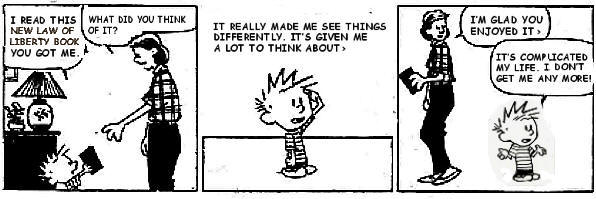|
|
 |
| Law of Liberty
is the rational solution to the
idea of Evil. In Western religion.
Evil is usually perceived as one of two
opposing principles or forces. Evil being any any action, thought or
attitude that is contrary to the nature or will of God.
There are those who actually believe that evil is a force or a substance. Many even believe it has a physical quality and can be transferred from one person to another. Those who accept that there is such a thing as evil have bound themelves to man-made laws. Paul, in his letter to Titus says: Unto the pure all things are pure: but unto them that are defiled and unbelieving is nothing pure; but even their mind and conscience is defiled. Don't give heed to Jewish fables, and the commandments of men And again in his letter to the Romans, he repeats;There is therefore now no condemnation to them who walk not after the flesh, but after the spirit --Romans 6:1 I know, and am persuaded by the Lord Jesus, that nothing unclean of itself: but to him that esteemeth any thing to be unclean, to him it is unclean. Romans 14:14. And in his letter to the Galatians: For you, brethren, have been called to liberty; only do not use liberty as an opportunity for the flesh, but through love serve one another. Galations 5:13 James also speaks of the law of liberrty. But whoso looketh into the perfect law of liberty, and continueth therein, he being not a forgetful hearer, but a doer of the work, this man shall be blessed in his deed. James 1:25 What does all this mean? The basic original Christian doctrine was that we should no longer abide by the law of Moses, a law of carnal commandments, but that we should abide by the Spirit, which whispers in our soul and guides us along the right path. It is explained that the law is only a temporary guide that cannot cover every possibility. It is necessary only until we have attained the spirit. When we attend to the voice of the spirit we make correct judgements in accordance with the situation in which we find ourselves.
Situation
ethics
|